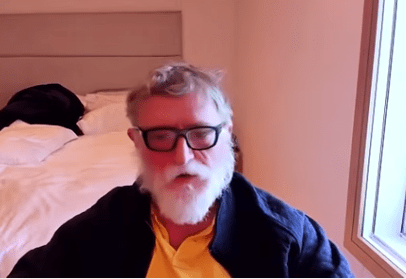With an estimated net worth of $9.5 billion, Gabe Newell is a striking example of how entertainment and technology can combine to produce wealth comparable to that of media tycoons and oil tycoons. Widely known by his loving nickname “Gaben,” he co-founded Valve and led it from a modest developer to a digital behemoth, making him one of the most significant characters in gaming. His tale, which demonstrates how risk-taking, timing, and foresight turned a coder into one of America’s richest businessmen, is especially inventive.

Valve, the private business he founded in 1996 with fellow former Microsoft employee Mike Harrington, is largely responsible for his income. Their first game, Half-Life, was remarkably ambitious, fusing innovative gameplay with dramatic storytelling in a way that felt remarkably reminiscent of Hollywood thrillers yet had the interactive complexity that only video games could offer. Its popularity opened the door for additional well-known games, such as Portal, Left 4 Dead, and Counter-Strike, all of which strengthened Valve’s standing as a creative force and guaranteed a consistent flow of royalties that continue to bring in money decades later.
| Full Name | Gabe Logan Newell |
|---|---|
| Born | November 3, 1962 (age 62), Colorado, U.S. |
| Other Names | Gaben |
| Education | Harvard University (dropped out) |
| Profession | Video game developer, businessman |
| Known For | Co-founding Valve, Steam, Half-Life, Portal, Counter-Strike |
| Title | President of Valve Corporation |
| Net Worth | Estimated $9.5 billion (2024) |
| Spouse | Lisa Mennet Newell (m. 1996, divorced) |
| Children | 2 |
| Awards | BAFTA Fellowship (2013), AIAS Hall of Fame Award (2013) |
| Reference | Forbes Billionaires |
However, Steam—a digital platform that was introduced in 2003—is Valve’s crown jewel. Despite initial skepticism, it developed into a highly adaptable service that transformed the way gamers purchase, download, and play games. By keeping about 30 percent of each sale, Valve was able to establish an extremely effective and long-lasting revenue stream. In addition to being a retailer, Steam is a community center with multiplayer compatibility, mods, and a flourishing independent developer ecosystem. Its accessibility proved especially advantageous for early-stage studios, providing them with a worldwide platform without the expenses associated with traditional distribution.
As a result, the platform has become so powerful that rivals like Ubisoft Connect and Epic Games Store have only partially undermined it. Valve’s dependence on regular new releases was greatly diminished by this supremacy, as Steam turned into a money-printing machine. Forbes reported that Newell may own half of the company, making him the richest person in gaming. His net worth increased in tandem with the company’s growth. His wealth, which is remarkably comparable to that of certain Hollywood moguls, highlights how the economic equilibrium in the entertainment industry has changed as a result of digital marketplaces.
Nevertheless, Newell frequently credits “luck” and “great people” for his accomplishment. In contrast to his unusual career path, his humility seems very sincere. He left Harvard to work at Microsoft, where he developed the initial iterations of Windows. The choice, made in the 1980s, placed him in a business that was revolutionizing computing. He and Harrington were able to finance Valve by using the money he amassed there, adopting a strategy that conventional publishers would have probably rejected. His experience at Microsoft significantly enhanced that leap, which is similar to the paths taken by other tech pioneers like Elon Musk and Steve Jobs who abandoned stability in favor of innovation.
The culture at Valve is exceptionally good at encouraging creativity. The organization has continuously produced innovations because of its flat management structure and encouragement of employees to work on initiatives that are motivated by their passions. Since creatives flourish in an atmosphere that promotes independence, this strategy has proved especially creative in keeping great talent. It also clarifies why Valve continues to maintain their legendary status while releasing fewer games—quality, not quantity, is what makes them famous.
Steam’s influence has spread to unanticipated places. Digital goods like skins and loot crates propelled in-game economies, resulting in a billion-dollar industry. Esports were facilitated by games such as Counter-Strike: Global Offensive, where fans spent money and time on cosmetics. This concept, which scaled far more quickly than traditional merchandising, served as a model for innumerable other businesses, including mobile app developers and Fortnite. Valve altered customer behavior by normalizing digital goods, which has an effect on other businesses.
In addition, Newell has expanded his wealth outside of gaming. He owns Oceanco, a yacht maker, Starfish Neuroscience, which studies brain health, and Inkfish, a marine research organization. His interest and desire are evident in these endeavors, which are especially helpful in coordinating his wealth with advancements in science and lifestyle. They draw attention to the fact that billionaire businesspeople frequently branch out from their original sectors, repurposing resources to support social progress in unanticipated fields.
His wealth is especially striking because it represents the rise of gaming. Gaming, which was once written off as childish entertainment, now brings in more money than both music and movies put together. That change is reflected in Newell’s wealth, demonstrating that the business can create giants with the same level of influence as any studio head in Hollywood or record label founder. With the growth of streaming, esport, and virtual reality in recent years, the impact of individuals like as Newell on the formation of culture has been remarkably evident.
In contrast, fans view him as a personable individual rather than a detached CEO. His sporadic, humorous, and modest public appearances lend an air of accessibility. His remarks regarding piracy, which argued that offering a service superior to the pirated choice is the best deterrent, were extremely successful in encapsulating his pragmatic worldview. That position seems remarkably similar to Steve Jobs’ strategy with iTunes: use convenience rather than punishment to address customer complaints.
